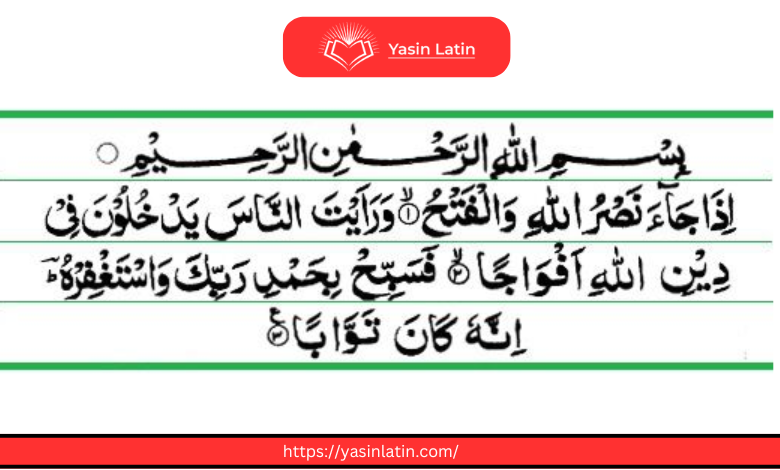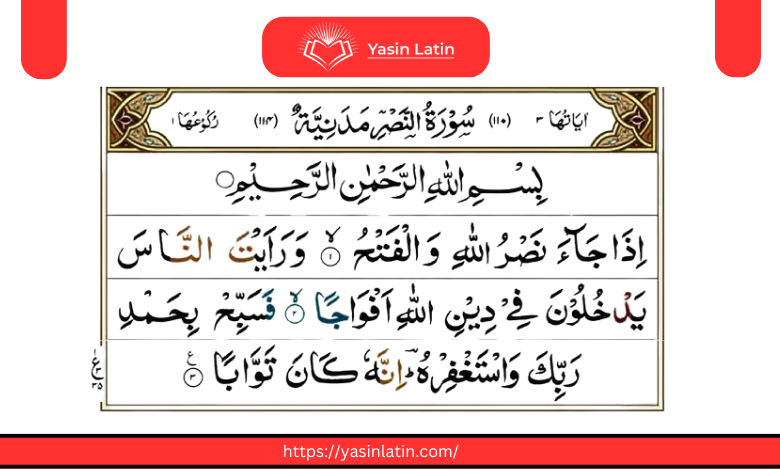Surah Al-Nasr (سورة النصر), also known as “The Divine Support” or “The Victory,” is the 110th chapter of the Quran. It is one of the shortest surahs, consisting of only three verses, yet it carries profound meanings and lessons for believers. Revealed during the final years of Prophet Muhammad’s (peace be upon him) life, Surah Al-Nasr marks a significant moment in Islamic history the conquest of Makkah and the widespread acceptance of Islam. This article provides a detailed exploration of Surah Al-Nasr, including its transliteration, translation, Arabic text, and the lessons it imparts. Whether you are a beginner or seeking to deepen your understanding, this guide will help you connect with this powerful surah.

Contents
- 1 Table of Contents
- 2 1. Surah Al-Nasr Transliteration: A Step-by-Step Guide
- 3 Step 1: Listen to Audio Recitations
- 4 Step 2: Break It Down
- 5 Step 3: Practice Tajweed Rules
- 6 Step 4: Recite Along with a Teacher
- 7 2. Surah Al-Nasr Transliteration
- 8 3. Surah Al-Nasr English Translation
- 9 4. Surah Al-Nasr Arabic Text
- 10 5. Reflecting on the Victory Message in Surah Al-Nasr
- 11 The Conquest of Makkah
- 12 Lessons for Believers
- 13 6. Understanding the Meaning Behind Surah Al-Nasr
- 14 Verse 1: The Promise of Victory
- 15 Verse 2: The Spread of Islam
- 16 Verse 3: Gratitude and Repentance
- 17 7. The Rewards of Reciting Surah Al-Nasr
- 18 8. Conclusion
- 19 9. FAQs
- 20 1. What is the benefit of reading Surah Al-Nasr?
- 21 2. What does “Al-Nasr” mean in English?
- 22 3. What number is Surah Al-Nasr in the Quran?
- 23 4. When was Surah Al-Nasr revealed?
- 24 5. How can I learn to recite Surah Al-Nasr correctly?
Table of Contents
Surah Al-Nasr Transliteration: A Step-by-Step Guide
Surah Al-Nasr Transliteration
Surah Al-Nasr English Translation
Surah Al-Nasr Arabic Text
Reflecting on the Victory Message in Surah Al-Nasr
Understanding the Meaning Behind Surah Al-Nasr
The Rewards of Reciting Surah Al-Nasr
Conclusion
FAQs
1. Surah Al-Nasr Transliteration: A Step-by-Step Guide
Learning Surah Al-Nasr transliteration is an excellent way to recite it correctly and reflect on its meaning. Here’s a step-by-step guide to help you master its recitation:
Step 1: Listen to Audio Recitations
The first step to reciting Surah Al-Nasr correctly is to listen to its recitation by a qualified Qari (reciter). Focus on the pronunciation, rhythm, and pauses. You can find numerous audio recordings online or use Quran apps that provide recitations by renowned Qaris.
Step 2: Break It Down
Divide the surah into its three verses and practice each one individually. Repeat each verse multiple times until you feel confident in its pronunciation before moving on to the next.
Step 3: Practice Tajweed Rules
Tajweed is the set of rules governing the pronunciation of the Quranic text. Pay attention to the Tajweed rules while reciting Surah Al-Nasr, such as proper elongation (madd) and clear articulation of letters.
Step 4: Recite Along with a Teacher
If possible, recite Surah Al-Nasr under the guidance of a qualified Quran teacher. They can correct your mistakes and provide personalized feedback to improve your recitation.
2. Surah Al-Nasr Transliteration
Here is the transliteration of Surah Al-Nasr to help you recite it correctly:
Iza jaaa’a nasrul laahi walfath
(When the victory of Allah has come and the conquest)Wa ra-aitan naasa yadkhuloona fee deenil laahi afwajaa
(And you see the people entering into the religion of Allah in multitudes)Fasabbih bihamdi rabbika wastaghfirh; innahoo kaana tawwaabaa
(Then exalt [Him] with praise of your Lord and ask forgiveness of Him. Indeed, He is ever Accepting of repentance.)
3. Surah Al-Nasr English Translation
The English translation of Surah Al-Nasr is as follows:
When the victory of Allah has come and the conquest,
And you see the people entering into the religion of Allah in multitudes,
Then exalt [Him] with praise of your Lord and ask forgiveness of Him. Indeed, He is ever Accepting of repentance.

4. Surah Al-Nasr Arabic Text
Here is the Arabic text of Surah Al-Nasr:
بِسْمِ اللَّهِ الرَّحْمَنِ الرَّحِيمِ
إِذَا جَاءَ نَصْرُ اللَّهِ وَالْفَتْحُ
وَرَأَيْتَ النَّاسَ يَدْخُلُونَ فِي دِينِ اللَّهِ أَفْوَاجًا
فَسَبِّحْ بِحَمْدِ رَبِّكَ وَاسْتَغْفِرْهُ إِنَّهُ كَانَ تَوَّابًا
5. Reflecting on the Victory Message in Surah Al-Nasr
Surah Al-Nasr was revealed during a pivotal moment in Islamic history—the conquest of Makkah. This event marked the triumph of Islam and the fulfillment of Prophet Muhammad’s (peace be upon him) mission. The surah’s message is clear: victory comes solely from Allah, and believers must respond with gratitude, humility, and repentance.
The Conquest of Makkah
When Prophet Muhammad (peace be upon him) entered Makkah as a conqueror, he demonstrated unparalleled humility. Instead of seeking revenge or displaying pride, he forgave his enemies and praised Allah for the victory. This act of humility and gratitude embodies the teachings of Surah Al-Nasr.
Lessons for Believers
Gratitude in Success: The surah reminds us to be grateful to Allah for every success and blessing.
Humility: True success is accompanied by humility, not arrogance.
Repentance: Seeking forgiveness from Allah is essential, even in moments of triumph.
6. Understanding the Meaning Behind Surah Al-Nasr
Surah Al-Nasr consists of three verses, each carrying profound meanings:
Verse 1: The Promise of Victory
“When the victory of Allah has come and the conquest”
This verse refers to the conquest of Makkah, a significant victory for Islam. It reminds believers that all success comes from Allah.
Verse 2: The Spread of Islam
“And you see the people entering into the religion of Allah in multitudes”
This verse highlights the widespread acceptance of Islam following the conquest of Makkah. It signifies the fulfillment of Prophet Muhammad’s (peace be upon him) mission to spread the message of Allah.
Verse 3: Gratitude and Repentance
“Then exalt [Him] with praise of your Lord and ask forgiveness of Him. Indeed, He is ever Accepting of repentance.”
This verse teaches believers to respond to success with gratitude and repentance. It emphasizes the importance of maintaining a strong connection with Allah, even in moments of triumph.
7. The Rewards of Reciting Surah Al-Nasr
Reciting Surah Al-Nasr brings numerous spiritual benefits and rewards:
Earning Allah’s Pleasure: The surah teaches us to glorify Allah, express gratitude, and seek His forgiveness, which brings us closer to Him.
A Reminder of Humility: It reminds us to remain humble in success, acknowledging that all victories come from Allah.
Strengthening Faith: The surah reinforces our faith in Allah’s power and mercy.
Spiritual Rewards: Reciting any part of the Quran earns immense rewards. The Prophet (peace be upon him) said:
“Whoever recites a letter from the Book of Allah, he will have a reward, and that reward will be multiplied by ten.” (Tirmidhi)Intercession on the Day of Judgment: The Quran will intercede for those who recite it regularly. The Prophet (peace be upon him) said:
“Recite the Quran, for it will come as an intercessor for its reciters on the Day of Resurrection.” (Muslim)
8. Conclusion
Surah Al-Nasr is a powerful reminder of Allah’s support and the importance of gratitude, humility, and repentance. Its concise verses carry profound lessons that are relevant to every believer. By learning and reflecting on Surah Al-Nasr, we can deepen our connection with Allah and strengthen our faith.
If you wish to learn more about the Quran and its teachings, consider enrolling in courses offered by Ulum Al-Azhar. Their certified instructors and authentic syllabuses provide an excellent opportunity to enhance your Quranic knowledge and recitation skills.
9. FAQs
1. What is the benefit of reading Surah Al-Nasr?
Reciting Surah Al-Nasr reminds us that victory comes from Allah, encourages gratitude and humility, and strengthens our faith.
2. What does “Al-Nasr” mean in English?
“Al-Nasr” means “The Divine Support” or “The Victory.”
3. What number is Surah Al-Nasr in the Quran?
Surah Al-Nasr is the 110th chapter of the Quran.
4. When was Surah Al-Nasr revealed?
Surah Al-Nasr was revealed during the final years of Prophet Muhammad’s (peace be upon him) life, around the time of the conquest of Makkah.
5. How can I learn to recite Surah Al-Nasr correctly?
You can learn to recite Surah Al-Nasr by listening to audio recitations, practicing Tajweed rules, and seeking guidance from a qualified Quran teacher.
By mastering Surah Al-Nasr and reflecting on its meaning, you can draw closer to Allah and embody its timeless lessons in your daily life.

